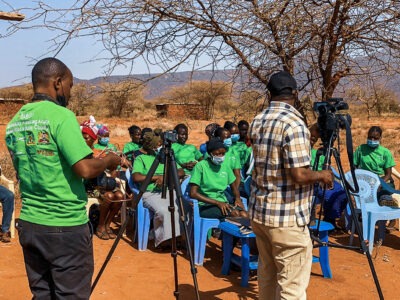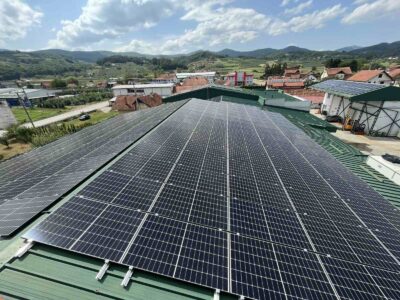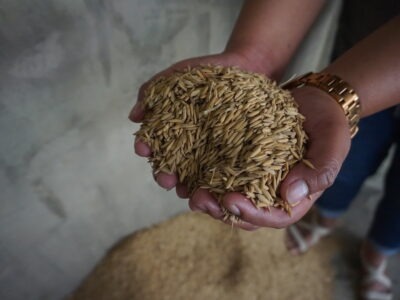
In Northern Kenya men traditionally manage their families’ livestock assets as producers, traders, and protectors against rustlers. Women, on the other hand, perform household tasks and take care of the children. These duties often make it hard for women to engage in economic activities to improve their families’ food security. Three women from Isiolo County are transcending their society’s gender inequalities to engage in economic activities to support their families.
Meet Rose Ribayo (35), Nalaleta Leseulio (mid-20s), and Lisayon Lemarron (early 60s). The three women formed the Naasicho Business Group after interacting with the USAID Feed the Future Kenya Livestock Market Systems Activity, which implements the Rural Entrepreneur Access Project (REAP). REAP is a two-year poverty graduation model developed by the BOMA Project to empower women to exit extreme poverty by building their resilience to shocks and stresses.
“The meaning of Naasicho, our group name, is ‘hardworking’ translated from [the] Samburu language,”—Rose Ribayo, Naasicho Business Group member
Prior to joining REAP, Rose and Lisayon earned extra money by making and selling homemade brew. Nalaleta, who is recently widowed, had to move back to her mother’s home with her children. The three women, among other REAP participants, were selected through a participatory community process. They receive asset transfers at the group level and training and mentorship to set up small businesses and come together to form savings groups.
Once a group has been formed under the REAP model, the members receive an asset transfer of Ksh. 20,000 (nearly $200USD) to start a business. Most participants opt to operate kiosks to sell livestock, grocery items, beads, curios or clothes.
In October 2018, the Feed the Future Kenya Livestock Market Systems Activity awarded the Naasicho Business Group an asset transfer of Ksh. 20,000 (nearly $200USD) to start a business. Rose, Nalaleta, and Lisayon opted to spread their risk by investing in two businesses: They put part of the money into a goat buying and selling business. They bought eight kids for Ksh. 10,000 ($98.33USD), and placed the balance of Ksh. 10,000 ($98.33USD) into buying sugar and salt, fast-moving commodities in their locality.
Within four months, the women sold one goat for Ksh. 4,800 ($47.20USD), making a profit of Ksh. 2,300 ($22.62USD). Meanwhile, the food stuff-selling business was making weekly sales of Ksh. 13,000 ($127.83USD) during market days in Kinisa, Isiolo County. Apart from selling their stock during market days, the women divided it into three parts to hawk door-to-door to their Manyatta neighbors.
“I am very proud of Naasicho Business Group’s members who have done tremendously well in working together in harmony and demonstrating that there is hope for me in the work I am doing as their mentor, and this gives me morale to work even harder to make a positive impact in the lives of women in Northern Kenya, ”—Christine Lina, REAP mentor, Kipsing ward, Isiolo county
To date, the Naasicho Business Group has doubled the value of its goat stock, from the initial Ksh. 10,000 ($98.33USD) to Ksh. 24,000 ($236USD). This is a great achievement, especially as the women successfully run two businesses while taking care of their families. The group has also increased the variety of products it sells to include cooking oil, flour, tea leaves, rice, and prepaid phone cards or “airtime.”
Economically empowered, the women support themselves and their families. Their future looks bright. They plan to expand both businesses by increasing the number of goats in their livestock business and increasing the stock in their foodstuff business.
USAID-funded Feed the Future Kenya Livestock Market Systems Activity supports 5,460 women in Northern Kenya to improve their livelihoods by facilitating their engagement in small businesses. The activity is implemented by ACDI/VOCA in consortium with Mercy Corps, The BOMA Project, and Smart Regional Consultants. Learn more here.





